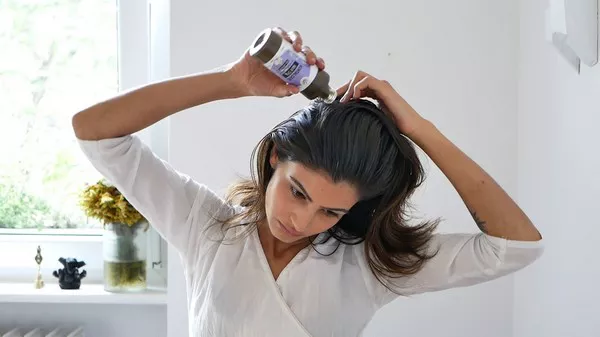When it comes to achieving luscious, healthy hair, many people seek natural remedies to stimulate hair growth. Among the myriad of options, oils have gained significant popularity due to their potential to nourish the scalp and promote hair growth. In this knowledge-sharing article, we will delve into the scientific evidence behind the effects of oils on hair growth. We’ll explore the benefits of specific oils, understand their mechanisms, and provide practical advice on how to use them effectively to stimulate hair growth. Whether you’re experiencing hair loss or simply want to enhance your hair’s natural growth, understanding the power of oils can be the key to unlocking your hair’s true potential.
I. The Science Behind Hair Growth
Before diving into the details of specific oils, it’s essential to grasp the basic science of hair growth. Hair grows in cycles, consisting of the anagen (growth), catagen (transitional), and telogen (resting) phases. During the anagen phase, hair follicles are actively growing, and the hair shaft is pushed upward. The length of the anagen phase varies from person to person, affecting hair length.
The rate of hair growth can be influenced by various factors, including genetics, age, hormonal balance, and overall health. Additionally, the health of the scalp plays a crucial role in supporting hair growth. A well-nourished and clean scalp fosters a favorable environment for hair follicles to thrive.
II. Oils that Stimulate Hair Growth
Several natural oils have been studied for their potential to stimulate hair growth. Let’s explore the most notable ones:
2.1. Castor Oil
Castor oil is well-known for its rich composition of fatty acids, particularly ricinoleic acid, which exhibits anti-inflammatory and antimicrobial properties. It is believed to promote blood circulation to the scalp, providing nourishment to hair follicles and encouraging hair growth.
To use castor oil effectively, mix it with a carrier oil like coconut oil or jojoba oil and massage it gently into the scalp. Leave it on for at least an hour or overnight before washing it out. Regular application can yield positive results.
2.2. Coconut Oil
Coconut oil is a versatile oil with a unique ability to penetrate the hair shaft and prevent protein loss. Its high content of medium-chain fatty acids allows it to moisturize and condition the hair, reducing the risk of breakage and promoting hair growth.
To use coconut oil for hair growth, warm it slightly and apply it evenly from roots to ends. Leave it on for at least 30 minutes before washing it off with a mild shampoo.
2.3. Peppermint Oil
Peppermint oil has been shown to increase blood flow to the scalp, which may promote hair growth. Its cooling sensation can also help soothe an itchy scalp caused by inflammation or dryness.
Mix a few drops of peppermint oil with a carrier oil and massage it gently into the scalp. Be cautious with the concentration, as peppermint oil is potent and may cause skin irritation when used undiluted.
2.4. Rosemary Oil
Rosemary oil is rich in antioxidants and has been studied for its potential to improve hair growth. It may dilate blood vessels, thereby promoting blood circulation to the scalp and encouraging hair follicles to produce thicker and stronger hair.
Combine a few drops of rosemary oil with a carrier oil and massage it into the scalp. Leave it on for at least 30 minutes before rinsing thoroughly.
III. The Importance of Scalp Massage
Apart from using oils, incorporating regular scalp massage into your hair care routine can be highly beneficial for stimulating hair growth. Scalp massage increases blood flow to the hair follicles, delivering essential nutrients and oxygen for optimal hair growth.
Using the pads of your fingers, gently massage your scalp in circular motions for about 5 to 10 minutes before shampooing your hair. You can enhance the massage experience by adding a few drops of your preferred oil.
IV. Nutrition and Hair Growth
While external treatments like oil applications are essential for hair growth, the significance of proper nutrition cannot be overlooked. A well-balanced diet that includes essential vitamins and minerals such as biotin, zinc, iron, and vitamin C can contribute to healthy hair growth.
Incorporate foods like eggs, nuts, leafy greens, and fruits into your diet to support your hair’s growth and overall health.
Conclusion
In conclusion, the use of oils to stimulate hair growth has gained popularity due to their natural properties and potential benefits. While oils like castor, coconut, peppermint, and rosemary have shown promising results, it’s essential to remember that individual responses may vary.
To experience the best results, combine the use of appropriate oils with regular scalp massage and a balanced diet. However, if you experience any adverse reactions or persistent hair loss, consult a qualified healthcare professional or dermatologist for personalized advice.
By understanding the science behind hair growth and utilizing the power of natural oils, you can embark on a journey towards achieving the beautiful, healthy hair you desire. Remember to be patient and consistent in your hair care routine, and you’ll soon reap the rewards of your efforts.

